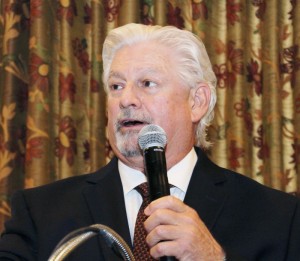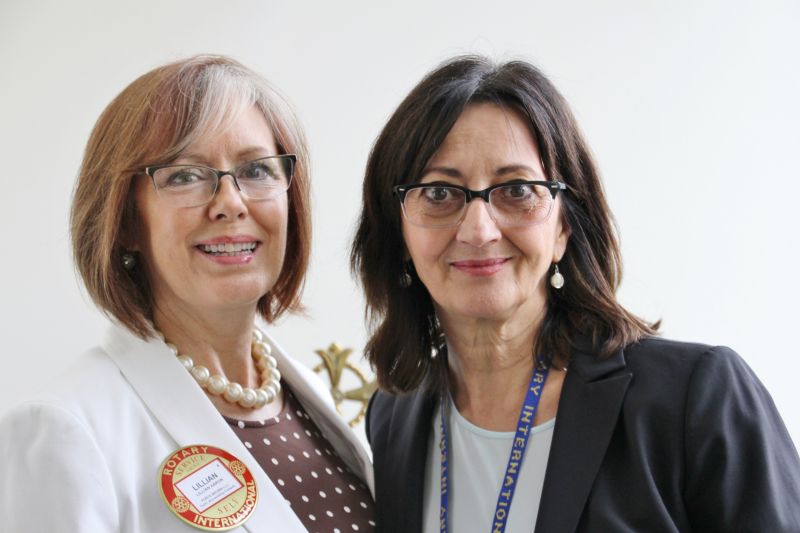Meeting held on April 12th, 2016, Recorded by Anita (Landwehr) Bailey
President Harold Ingersoll called the meeting to order right at noon. Lillian Aaron led the pledges and Adrianne Marks gave the invocation. Russell Gallahan led us in reciting the “FOUR WAY TEST”. Vera Keric was our greeter at the top of the stairs and Rich Fikani checked-in our visitors and guests.
Richard Payton instructed us about signing up for Meetup.com followed by Russell Gallahan announcing today’s RCA Red Badge/Mentoring Class which will be led by Ann Graham.
Jim Bryce gave an interesting Global Awareness Update about Rotary’s presence in Antarctica.
President Harold Ingersoll made several announcements (make sure to ask Jim Innes or Mike O’Krent about their recent trip to Jerusalem), he exchanged Club banners with a visiting Rotarian from India then we had Fellowship time!
Ann Graham introduced our speaker, Bower Yousse, who was a teammate and childhood friend of Freddie Steinmark and is an author of a biography about him. Highlights from Bower’s presentation include:
- Ed Perlmutter, Congressional Representative 7th District Colorado, presented Bower’s book to Congress.
- Dr. Norman Coleman – National Cancer Institute, Center for Cancer Research, became an oncologist because of Freddie.
- Freddie was very humble and never wanted to be in the lime light. His mother, Gloria, asked Bower to write an autobiography of Freddie’s life. Bower spent 3 years with the family, researching the family archives for the book.
- Bower grew up with Freddie in Weaver, Co., which is a small suburb of Denver. Freddie had a dream of playing football for the Chicago Bears or Notre Dame. As a young man he learned every position of the team. At any age he could dominate the game. His father told him that he would never be better than his team. Freddie was a quiet leader and led by example. He was always the first to show up at practice.
- There is an incident, captured on film, during a high school game when Freddie ran a 77 yard game winning touchdown. He brought back pride and a winning spirit for his team and community. Led his high school football team to a state championship.
- Initially, no university would offer Freddie a scholarship, as he was told he was too small to play. Coach Royal of the University of Texas saw the film of Freddie’s touchdown and he saw to it that Freddie got a scholarship. Freddie was very excited, but his father cautioned him that he would be starting at the bottom and to give it his all, always! Freddie earned respect right away. He started in the safety position and was the 2nd sophomore Darryl Royal ever started.
- The last game he was to play was in the Cotton Bowl against Notre Dame. He said he was not big enough to play with Notre Dame but was big enough to play against them. However, before the game, Freddie was diagnosed with cancer in his leg and was sent to MD Anderson for surgery to remove the tumor. He lost his entire leg instead. When he woke from surgery, one of his first questions was “Are there any one-legged kickers?”
- Freddie helped change the conversation about cancer in the US. While he was in the hospital recovering he received a call from President Nixon congratulating him about the upcoming game (the Cotton Bowl), and he said he would be there on the side lines. When doctors told Freddie he could not go anywhere for 6 weeks, he went to the hospital parking lot to practice getting in and out of a car with crutches. He went to the Cotton Bowl and watched his team beat Notre Dame. He said it was the best day of his life.
- Several months later, Freddie did end up losing his life to cancer. He then became a poster child for cancer, and President Nixon passed the Cancer Act in 1971.
- We heard a recording that Howard Cosell gave about Freddie’s life that was moving. There was a movie made which tells Freddie’s story, but the book is better, according to Bower. Faith guided everything that Freddie did in his life.


